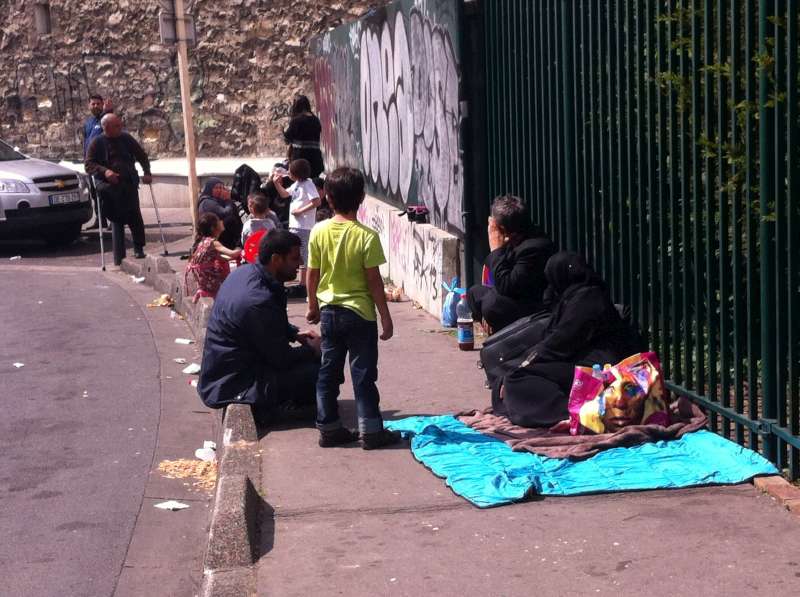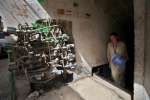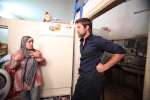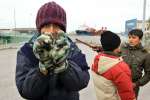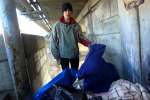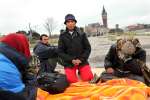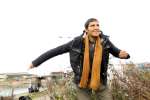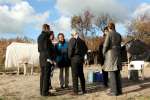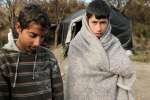A learning experience for UNHCR as Syrian refugees arrive in the outskirts of Paris
News Stories, 29 April 2014
SAINT-OUEN, France, April 29 (UNHCR) – A stone's throw from the Périphérique, Paris' busy ring road, a group of Syrian children play football in the street, while their mothers sit on the pavement on sleeping bags or push babies up and down the road in strollers.
There is an old man on crutches, a little boy missing an arm and at least two pregnant women. A Syrian man who says he was tortured while in detention, shows his scars. They are part of a group of around 200 Syrians who have been camping for several days in a park in Saint-Ouen, a working class suburb just to the north of the French capital.
The long journey from their war-torn country to France was full of danger and littered with physical and administrative obstacles. Most of the Syrians come from the cities of Homs, Aleppo and Latakia. They fled to neighbouring Lebanon, and then slowly made their way across North Africa to the Spanish enclave of Melilla. Some had valid travel documents, but others had to use stealth to get across heavily guarded borders to reach safety in Europe.
"In Aleppo, I owned a restaurant," a young man with spectacles and a neatly trimmed beard says, as two young children clutched his legs. "But when the war came, I had to flee with my two children and my pregnant wife. To cross one border, I had to hide the children in a sack and carry it on my shoulders… I want to stay here in France now, where human rights are respected and where it is safe for my children to grow up."
Unlike other European countries such as Germany or Sweden, France has until now received relatively few Syrian asylum-seekers. This may be about to change. "My family is on its way here," a stocky middle-aged man in a leather jacket tells UNHCR. "They left Homs and are now in Algeria. I told them to come to France because this is a good country and we can get help here."
After being alerted by a local association about the presence of the Syrian families in the park, the UN refugee agency and France Terre d'Asile, a non-governmental organization that works for refugees and asylum-seekers, went to Saint-Ouen to assess the situation.
"We found about 40 Syrian families in this park," UNHCR's Florence Boreil notes. "There were many children, some of them with injuries, as well as babies, pregnant women and people with medical needs. They all stayed in the park during the day and slept at night in hostels paid by local charities, in old cars or in the street. We had to take action urgently. A number of children and adults who required medical help were taken to hospital."
UNHCR has approached the local and national authorities to ensure that the Syrians will be able to file asylum applications and that their accommodation needs will be given urgent attention.
"There is a lack of accommodation for asylum-seekers, particularly in Paris and other big cities," explains Philippe Leclerc, UNHCR's representative in France. "This is a structural problem, but the authorities are looking into the case of these Syrian families as a matter of priority and solutions will be found for them. Two families have already been transported to Roanne and Chambery, where temporary accommodation will be provided for them. Others will go to Vichy, Besançon and the Pas de Calais region."
Interviews for those Syrians applying for refugee status have started and the authorities have promised that they will speed up the asylum procedure and give a decision within a fortnight of receiving an application. Normally, the average time for a first instance decision on asylum applications in France is six months, although in the case of Syrians, the waiting period has already been reduced to three months.
"This has been a useful learning experience for all of us," concludes Philippe Leclerc, "Particularly at a time when we are engaged in discussions with the government and civil society on a major reform of the asylum system. The number of Syrian asylum-seekers is likely to increase and we need to be ready to receive them."
By William Spindler in Saint-Ouen, France




